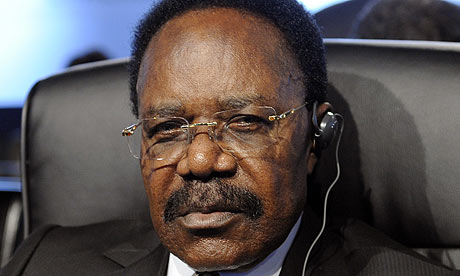
Omar Bongo in 2007. Photograph: Eric Feferberg/AFP/Getty Images
After disputed reports, west African country's regime admits world's longest serving head of government has died. Gabon's President Omar Bongo, the world's longest serving head of government, has died today in a Spanish hospital at the age of 73.
Bongo, ruler since 1967 of the west African country, had been receiving treatment for cancer for more than a month.
In a statement released at the Quiron hospital in Barcelona this evening, the Gabonese prime minister, Jean Eyeghe Ndong, said: "At 2.30pm the medical team, officials and family members informed me that his excellency President El Hadj Omar Bongo Ondimba has given up his soul following a cardiac arrest."
A few hours earlier Gabonese officials had angrily denied reports of Bongo's death, with Ndong insisting he was "alive and well". Gabonese media were banned from discussing the president's health, with the population told that "Papa Bongo", as he is known, was resting after the death of his wife in March.
In the capital, Libreville – where Bongo's name and image adorn everything from stadiums to bottled water – internet services were cut for some time, restricting access to international news. The foreign ministry went so far as to summon the French ambassador to protest about French media reports of Bongo's death that Ndong said were intended "to sow doubt in the spirit of the Gabonese for undesirable ends".
Last night, Gabonese state television announced the closure of all borders and called for the population to remain calm.
Bongo is expected to be succeeded by his son Ali-Ben Bongo, the defence minister.
Omar Bongo was one of Africa's youngest leaders when he took power at the age of 31 after the death of Gabon's first president, Leon M'ba. His rise coincided with an oil boom that saw his country become the continent's third-biggest petroleum producer.
A canny politician, he placed close relatives in key cabinet positions and systematically bought off any rivals, thus avoiding the fate of many of his fellow "Big Man" African rulers who were eventually ousted. Under pressure to reform in the 1990s, he introduced multi-party democracy but later repealed term limits, ensuring himself the presidency for life.
Defending his rule, Bongo pointed to his success in keeping the country peaceful despite the varied ethnic mix of its 1.3 million people. Many older Gabonese regard it as a genuine achievement.
But his squandering of billions of dollars in oil wealth on patronage and personal comforts has tarnished his legacy. Near half a century after independence, the country has more miles of oil pipelines than it does of roads, and most of the population remains poor.
Bongo's death means the loss to France of a leader who was until very recently its closest ally in Africa. Under his rule, French companies were able to dominate the economy, particularly the oil sector, where a culture of kickbacks and bribes kept the local elite content.
A French military base in Libreville allowed Paris to keep a close watch on neighbouring Francophone states and offered Bongo security.The cosy relationship has frayed in recent years due to Nicolas Sarkozy's pledge to reform the decades-long "Francafrique" policies of self-interest that encouraged opacity and theft of state funds.
Last month a French magistrate launched an investigation into the excesses of three African leaders, including Bongo. A police report revealed that Bongo's family owned at least 30 properties and nine luxury cars and had more than 70 bank accounts in France alone.
The case infuriated Bongo and may have influenced his decision to seek medical help in Spain rather than France































No comments:
Post a Comment